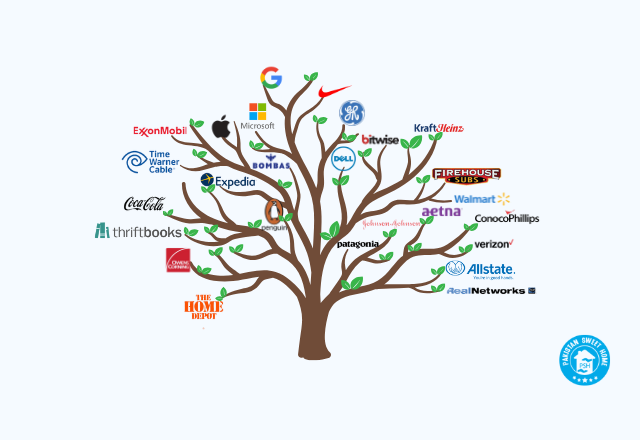Exploring Exactly How Company Philanthropy Shapes Brand Credibility and Customer Loyalty
Business philanthropy considerably affects brand name credibility and client loyalty. Companies that engage in authentic philanthropic efforts often see a favorable shift in just how customers perceive them. This placement of worths cultivates trust and psychological connections with audiences. The efficiency of these humanitarian initiatives can vary greatly. Comprehending what truly reverberates with consumers is essential for brands looking for to boost their social impact and market position. What methods will emerge as vital for future success?
The Evolution of Company Philanthropy
As businesses increasingly identify their function in culture, the evolution of business philanthropy has actually transformed from plain philanthropic contributions to a strategic component of brand identity. Initially, companies involved in philanthropy mainly for tax obligation advantages or to improve their public picture. With time, this approach moved as stakeholders-- consisting of financiers, staff members, and consumers-- demanded an extra authentic commitment to social responsibility.
Organizations began straightening their kind initiatives with their core worths and service purposes, resulting in even more thoughtful and impactful payments. This change has actually urged firms to purchase lasting techniques and area advancement, fostering a sense of purpose that reverberates with consumers.
Furthermore, technical innovations have actually promoted transparency and interaction, enabling organizations to showcase their humanitarian initiatives better. Business philanthropy has actually arised as an essential component of service technique, with organizations accepting the chance to favorably affect culture while boosting their overall brand name story.
The Impact of Philanthropy on Brand Understanding
While business engage in humanitarian initiatives to promote social excellent, these efforts greatly form brand name perception among customers. Corporate philanthropy can improve a brand name's photo by linking it with positive social effect and area participation. Customers usually regard brands that proactively take part in charitable tasks as even more trustworthy and responsible. This assumption can affect investing in choices, as consumers may prefer brand names that demonstrate a dedication to social concerns.

Building Emotional Links Through Granting
Corporate philanthropy acts as a powerful tool for enhancing brand identification by connecting corporate worths with neighborhood demands. With tactical offering, companies can foster area involvement and create shared worths that resonate with consumers on an emotional degree. This technique not just enhances brand online reputation however additionally builds long lasting connections in between companies and their stakeholders.
Enhancing Brand Identity
They not only contribute to social good however additionally create much deeper psychological connections with their target markets when business engage in kind efforts. By aligning their brand name with charitable causes, firms boost their identity and signal values that resonate with customers. This positioning creates a narrative that goes beyond services and items, inviting consumers to take part in a common objective. As consumers progressively focus on purpose-driven brand names, business that proactively participate in offering can separate themselves in a crowded market. Such efforts cultivate a sense of loyalty amongst consumers who feel directly attached to the brand name's values. Inevitably, business philanthropy ends up being a necessary tool for enhancing brand name identity, growing enduring relationships based on common beliefs and emotional engagement.
Fostering Community Involvement
Numerous research studies suggest that business engaging in community-focused philanthropic initiatives can significantly strengthen psychological links with their stakeholders. By purchasing local jobs and sustaining social reasons, services grow a sense of belonging and depend on within the neighborhood. This engagement promotes a favorable brand photo, as clients appreciate business that show real problem for social issues. Staff members often really feel much more inspired and honored to be connected with an organization that focuses on neighborhood welfare. Consequently, customers are more probable to create commitment towards brands that proactively contribute to significant causes. Eventually, cultivating area engagement through philanthropy not just improves brand name reputation yet likewise develops long lasting emotional connections that benefit both the community and the business it offers.
Producing Shared Values
How can businesses effectively create shared worths that resonate with their stakeholders? Companies can accomplish this by aligning their humanitarian initiatives with their core goal and the interests of their communities. By taking part in campaigns that deal with neighborhood demands, businesses promote emotional links with consumers, enhancing brand name loyalty. As an example, partnering with non-profits that show shared worths enhances the brand's image and demonstrates commitment to social responsibility. Furthermore, transparent interaction about these initiatives permits stakeholders to see the concrete impact of their contributions. Inevitably, by incorporating shared values right into their business philanthropy, firms not just improve their credibilities but also cultivate lasting partnerships with consumers, leading to increased loyalty and trust fund. This placement is vital in contemporary consumer decision-making.
Instance Studies: Effective Philanthropic Campaigns
Analyzing effective kind projects exposes different methods that boost brand reputation. Impactful area initiatives, ingenious partnership versions, and long-term involvement approaches have actually verified efficient in promoting positive links with customers. These study highlight the relevance of thoughtful company giving up achieving both social and business goals.
Impactful Neighborhood Initiatives
Numerous business have effectively leveraged humanitarian campaigns to boost their brand name reputation while making a significant impact in their areas. As an example, a modern technology company launched a digital literacy program in underserved neighborhoods, supplying training and resources that encouraged neighborhood residents. This initiative not only added to neighborhood advancement but likewise placed the firm as a socially accountable leader. Similarly, a major food business applied a hunger alleviation project, partnering with regional nonprofits to distribute meals to families in requirement. This effort reinforced community ties and promoted consumer loyalty. Through these impactful efforts, companies have actually demonstrated their commitment to social duty, successfully aligning their brand name worths with the needs of the neighborhoods they serve, inevitably enhancing their overall credibility.
Cutting-edge Collaboration Models
The success of impactful neighborhood efforts typically hinges on ingenious partnership versions that combine varied stakeholders to attend to complex social challenges. Study highlight how corporations, non-profits, and government entities can work together successfully. An international corporation partnered with a regional non-profit to introduce an education program, pooling resources and know-how to enhance neighborhood literacy prices. An additional example involved a technology business and a healthcare company joining forces to create a telemedicine remedy for underserved populations. These partnerships not only intensified the reach of humanitarian efforts however additionally enhanced the brand names' credibilities by aligning their objectives with visit this site right here community needs. Inevitably, innovative collaboration models offer as a stimulant for meaningful change and foster more powerful links in between brand names and their consumers.
Long-lasting Interaction Strategies

Determining the ROI of Company Social Responsibility
As companies increasingly invest in company social obligation (CSR) campaigns, recognizing the return on investment (ROI) related to these initiatives becomes necessary. Determining ROI in CSR is diverse, typically incorporating both qualitative and quantitative metrics. Financial returns can be examined with raised sales, enhanced brand loyalty, and enhanced worker spirits, which can cause higher productivity. Furthermore, companies may examine price savings linked to lasting techniques, such as minimized waste or energy intake.
Qualitatively, the effect of CSR on brand track record can be assessed with customer perception research studies and social networks sentiment analysis. Studies can provide insights into exactly how CSR tasks influence client loyalty and trust. In addition, benchmarking versus market standards can aid organizations determine their CSR efficiency. Inevitably, a complete method to gauging ROI enables firms to make enlightened choices regarding future CSR investments, straightening methods with both financial efficiency and social impact
Consumer Assumptions and Company Duty
Significantly, consumers expect companies to operate with a strong feeling of company obligation, checking out ethical methods as a requirement for brand name loyalty. This change in expectation shows an expanding recognition of social and ecological issues, leading clients to prefer brands that line up with their worths. Consumers are a lot more likely to sustain companies that take part in transparent methods, show sustainability, and add favorably to their areas.
Social media intensifies these assumptions, allowing consumers to share their viewpoints and experiences quickly. Brands that fall short to fulfill these ethical requirements run the risk of reaction, while those that welcome corporate obligation commonly take pleasure in superior track record and client commitment. As customers require accountability, companies must integrate business social duty into their core strategies, focusing on moral actions not equally as an advertising and marketing method, however as a basic element of their procedures. This placement can eventually result in more powerful brand name affinity and sustained success in open markets.
Future Trends in Corporate Philanthropy and Brand Loyalty
The landscape of business philanthropy is advancing, affected by the elevated customer expectations bordering business duty. Business are significantly incorporating social effect right into their core service approaches, not merely as a secondary activity. Future trends show a change towards openness, with brand names sharing thorough details about their humanitarian campaigns and their straight impacts on areas.
In addition, innovation is playing a critical duty, enabling real-time engagement in between consumers and brands. Social media platforms promote direct interaction, allowing customers to voice their expectations and hold brand names liable. Furthermore, younger generations, particularly Millennials and Gen Z, prioritize sustainability and ethical methods, driving organizations to take on more conscientious methods.
As business philanthropy ends up being associated with brand name identity, business that authentically straighten their missions with social demands are likely to foster stronger consumer loyalty. This convergence of values will eventually form the future of business track record and customer connections in a progressively conscientious industry.
Often Asked Concerns
How Do Consumers Learn about a Company's Philanthropic Initiatives?
Customers uncover a firm's kind efforts with numerous channels, including social media sites, news release, community occasions, and word-of-mouth. These opportunities facilitate awareness, allowing people to involve with brands that line up with their hop over to these guys passions and values.
What Duty Does Employee Involvement Play in Corporate Philanthropy?
Staff member involvement in corporate philanthropy improves involvement, promotes a feeling of ownership, and enhances team communication - corporate philanthropy. This participation frequently enhances the effect of charitable initiatives, resulting in better understanding and assistance for the company's kind initiatives
Can Corporate Philanthropy Backfire on a Brand's Online reputation?
Business philanthropy can indeed backfire on a brand's track record if viewed as opportunistic or insincere. Adverse public assumption might develop, bring about reduced count on and commitment among customers that focus on authenticity in corporate actions.
Are Smaller Companies as Reliable in Philanthropy as Larger Firms?
Smaller hop over to here companies can be equally reliable in philanthropy as bigger companies, often showing agility and authenticity. Their local efforts might resonate more deeply with neighborhoods, promoting authentic links regardless of limited sources contrasted to their larger counterparts.
Exactly How Can Firms Choose the Right Triggers to Assistance?
Firms can pick the right trigger by aligning their worths with community needs, examining stakeholder rate of interests, and reviewing possible influence. This critical strategy promotes credibility, boosts interaction, and enhances links with clients and the wider area.
While firms involve in humanitarian initiatives to promote social great, these campaigns substantially form brand perception amongst consumers. As customers progressively prioritize purpose-driven brand names, business that proactively engage in giving can distinguish themselves in a congested market. Many companies have efficiently leveraged kind projects to boost their brand name track record while making a purposeful influence in their communities. Progressively, customers anticipate business to run with a strong sense of company obligation, viewing honest methods as a prerequisite for brand loyalty. As business philanthropy ends up being identified with brand name identity, firms that authentically align their objectives with societal needs are most likely to promote more powerful client commitment.